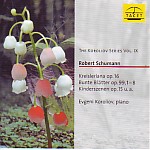At 36:43, Evgeni Koroliov’s Kreisleriana times out to be one of the longest on disc. This is not so much because of slow tempos as it is the pianist’s tendency to elongate phrases, stretch beats, and get hung up over local details at the expense of the big picture. Trouble begins with Koroliov’s slight tenutos in the opening movement’s outer sections. Nos. 4 and 6 are as slow as Schumann wishes, but with little sense of overall pulse. The same can be said for No. 2’s slow, shapelessly rendered episodes, in contrast to their quicker, sturdier counterparts. In this context, No. 7’s mad, metronomic dash throws you for a loop. Here Koroliov is one of the few pianists to rapidly arpeggiate the opening chord on the downbeat rather than treat the G, C, and D as pick-up notes. No. 8 is unusually brisk and too loud to send shivers.
Koroliov’s Kinderszenen is not exactly a paragon of lyrical warmth and expressive simplicity; it might be better translated as “Scenes From a Precocious Childhood”. A few telltale signs of the pianist’s largely intellectual approach: his shifts in rhythmic emphasis that transform the lighthearted lilt of Ritter Von Steckenpferd into Beethoven’s Grosse Fuge, and the way Kind Im Einschlummern’s soprano counter-line nearly overpowers the tenor melody.
The two Waldszenen selections bookending this release receive bleak, super-controlled interpretations that restore the shock value of Schumann’s dissonances. By contrast, the Op. 99 selections rival Richter for tenderness, soaring poetry, and luminous textures that seemingly scurry off the page by themselves, as the second Albumblätter gorgeously demonstrates. Jan Reichow’s booklet notes define pretentious, self-serving philosophical baloney, at least in English translation.
































